Iran awaits US response on indirect talks, signals Oman could mediate
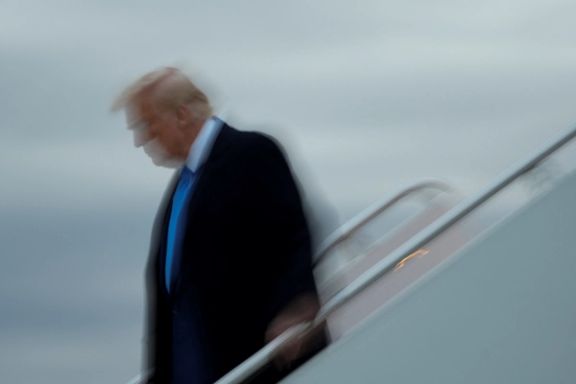
Iran is waiting for a decision from the United States on whether to engage in indirect negotiations, foreign ministry spokesman Esmail Baghaei said on Monday.

Iran is waiting for a decision from the United States on whether to engage in indirect negotiations, foreign ministry spokesman Esmail Baghaei said on Monday.
“We have conveyed our position to the US and are now awaiting their response on entering talks,” Baghaei said.
While US President Donald Trump has recently pushed for direct diplomacy with Tehran, Baghaei said that indirect talks remain Iran’s preferred path for now—but left the door open to future adjustments.
“Decisions will be made in line with conditions and at the appropriate time.”
He confirmed that technical discussions had already taken place covering both nuclear cooperation and sanctions relief.
“There have been exchanges and consultations on various aspects of the matter, including some technical details,” Baghaei said.
Confirming speculation, he finally said Iran will be looking to Oman as a mediator. “Should a new process begin, Oman would be one of the main candidates for this important task,” he added, Oman one of the mediators which helped Iran resume diplomatic relations with Saudi Arabia in 2023.
Baghaei also said the country had given approval for a visit by International Atomic Energy Agency chief Rafael Grossi, who earlier said he hopes to travel to Tehran by late April, showing the country's readiness to cooperate with international nuclear oversight.
Iran has always said its nuclear program is for peaceful purposes. Amid threats from the US to push Tehran into a new nuclear deal or risk being bombed, he added that Iran’s military remains vigilant.
“Our armed forces maintain and upgrade their readiness moment by moment to face any potential scenario,” Baghaei said.
In response to Trump's latest threats, Supreme Leader Ali Khamenei said that the Islamic Republic would deal a "strong blow" in retaliation for any attack.
Iran has also threatened to target American interests in the region, including the strategic US naval base, Diego Garcia in the Indian Ocean, if attacked.

In a new twist to Iran’s nuclear saga, the official government newspaper - Iran - said on Monday that Supreme Leader Ali Khamenei’s alleged fatwa against atomic weapons does not necessarily ban their production – only their deployment and use.
“The issue of nuclear weapons generally involves three components: production, stockpiling, and use or deployment,” the newspaper wrote—drawing a distinction that is rarely considered meaningful in academic or military discussions on nuclear strategy. The article went on to assert, “In the modern era, the possession of nuclear weapons—rather than their use—is inherently deterrent in nature.”
It appears that the government’s official newspaper is suggesting that producing and stockpiling atomic bombs is not a big issue as long as Iran says it has a fatwa prohibiting their use.
Iranian diplomats and officials often refer to a statement made by Khamenei in 2010 against weapons of mass destruction, calling their use “haram” or forbidden in Islam. They insist that this constitutes a fatwa, a religious ruling by a senior Shi’ite cleric that has the power of law.
However, Khamenei’s statement was submitted to a disarmament conference, and delivered in the tone of a political address, rather than as a formal religious ruling. It was neither published on Khamenei’s official website as a fatwa nor reiterated by him in subsequent speeches. Even if interpreted as a binding religious edict, a fatwa can be superseded by a new ruling, especially under the principle of expediency—a concept frequently invoked in Shi’ite jurisprudence to adapt religious rulings to changing political and strategic circumstances.
The newspaper argues that the Supreme Leader’s fatwa does not prohibit the production or stockpiling of nuclear weapons, which it claims serve purely as a deterrent, but only bans their use.
“If we consider the two reasons cited above for the prohibition of nuclear weapons,” the article states, “it becomes clear that they apply to their use—not their production or storage. The primary objective of developing such weapons is, fundamentally, deterrence.”
The two reasons referenced by Iran daily include a historical account from early Islam prohibiting the poisoning of water, and broad religious teachings said to be emphasizing the preservation of human life, civilians, and the environment.
This also suggests that the Islamic Republic’s stance on nuclear weapons is shaped more by interpretations of early Islamic teachings and the principles of Shi’ite clerical jurisprudence than by universal norms aimed at preventing mass destruction and civilian casualties.
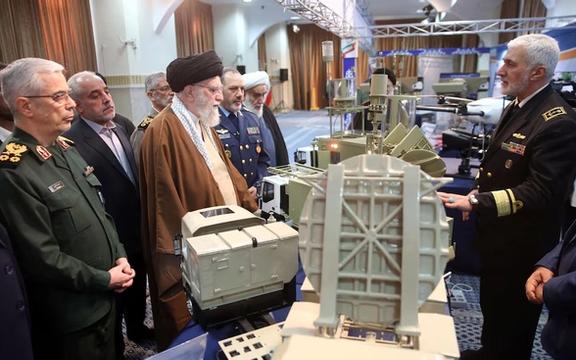
Iran warned regional states hosting US military forces that they could face retaliation if involved in a potential American attack, a senior Iranian official told Reuters.
The official, who spoke on condition of anonymity, added that Supreme Leader Ali Khamenei had placed Iran's armed forces on high alert.
Although US President Donald Trump has demanded direct negotiations, the official said Iran is open to a diplomatic path through intermediaries.
“Indirect talks offer a chance to evaluate Washington's seriousness about a political solution with Iran,” the official said. Talks via Oman could start soon if signals from the US align, though the official warned the path may be rocky.
Iran has issued formal warnings to Iraq, Kuwait, the UAE, Qatar, Bahrain and Turkey that allowing the US to use their airspace or territory during any attack would be treated as an act of hostility. Any such action “will have severe consequences for them,” the official said.
On Wednesday, Iranian state media reported that Kuwait had reassured Iran it would not permit aggression from its soil. Other governments approached by Reuters either declined to comment or did not respond. Turkey’s Foreign Ministry said it was unaware of any warning but suggested such messages could be delivered through alternative channels.
Meanwhile, Iran’s top military commander, Mohammad Bagheri, revealed the details of the Supreme Leader’s response to a letter sent by Trump on March 7.
“Negotiation directly is not acceptable, but indirect negotiation is not a problem,” Khamenei said in the message, according to Bagheri, the Chief of Staff of Iran's Armed Forces.
“You were the most disloyal and untrustworthy party in past negotiations, and thus there is no trust in you. However, we are not closing the door. If you act sincerely, negotiations can happen.”
According to Bagheri, Khamenei also told Trump that Iran is not pursuing a nuclear weapon. “We will respond with all our strength to any threats, but we are not warlike and will not start a war.”
Trump has warned Iran would be bombed if it did not agree to a new nuclear deal, prompting Khamenei to say on Monday that the Islamic Republic would deal a "strong blow" in retaliation for any attack.
Iran has also threatened to target American interests in the region, including its strategic Diego Garcia naval base in the Indian Ocean if it is attacked by the US.
The threats to neighbouring countries have escalated over recent months. In October, in the wake of Iran's attack on Israel which led to a retaliatory Israeli strike, The Wall Street Journal reported at the time that countries given warnings included Jordan, the United Arab Emirates, Saudi Arabia and Qatar, all of which host US forces.
It has since led to a complicating of regional dynamics. "US defense officials acknowledged that some regional partners have told the Pentagon that they don’t want Israeli warplanes flying over their territories or US troops launching offensive operations from inside or over their airspace," the WSJ reported.
"The Arab countries have said the US forces are allowed to conduct self-defense operations, the officials said," it added.
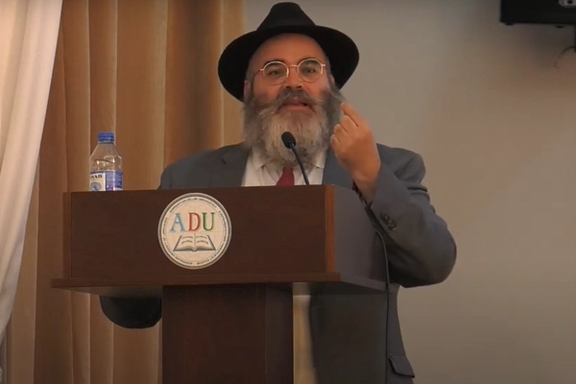
Iran attempted to pay a Georgian drug trafficker $200,000 to assassinate a Jewish religious leader in Azerbaijan, according to security officials cited by The Washington Post.
The operation, coordinated by the Quds Force of Iran’s Islamic Revolutionary Guard Corps, is part of what officials described as Tehran’s growing use of criminal proxies for targeted killings abroad.
“The [Iranian] officer handed Aslanov a photo of a prominent Jewish figure in Azerbaijan and detailed instructions on how to kill him,” one official said. “Aslanov agreed to kill Rabbi Shneor Segal for a price tag of $200,000.”
According to the Western and Middle Eastern security officials, the plot—thwarted by Azerbaijan’s State Security Service in early January—also included plans to target an educational center.
Aslanov and a local accomplice were arrested and charged with conspiracy to carry out a terrorist act, as stated by the State Security Service and reported in local media at the time.
The officials said the operation was arranged by Mohammad Golkari, an Iranian national with longstanding ties to organized crime, who helped coordinate Aslanov’s meeting with Quds Force operatives in Iran. After receiving instructions and the target's photo, Aslanov returned to Baku and recruited Azerbaijani citizen Jeyhun Ismayilov to assist with surveillance.
It is not the first such Iranian attack to be foiled in Azerbaijan. In 2023, then Foreign Minister Eli Cohen said Iran was responsible for a foiled plot to attack the Israeli embassy in Azerbaijan.
“Tehran stands behind the attempt ... Iranian terror is a global threat, as we saw in the past few days in Azerbaijan in an attempted attack against the Israeli Embassy in Baku, as well as in recent months in Cyprus and Greece in attempted attacks against Israelis and Jews,” he said at the time, saying Iran had funded and issued instructions to the terror cell that attempted the attack.
In the year before the war began in October 2023, Israel's chief of Mossad, David Barnea, said 27 Iran-backed plots had been foiled in Europe, Africa, the Far East and South America.
But Iran-backed plots to kill Jews and Israelis abroad have ramped up since the Gaza war, dozens foiled globally, in addition to plots inside the Jewish state.
Last week, ahead of the passover holiday next week, Israel's National Security Council warned the Israeli public to remain vigilant when traveling abroad amid concerns that Iran, Hamas, Hezbollah and global Jihadist groups will continue to actively advance attacks against Jews and Israelis worldwide.
"With the collapse of the cease-fire and resumed fighting in Gaza, we are expecting to see an increase in attempted attacks against Israeli/Jewish targets abroad carried out by local initiatives or lone-wolf attackers," the Council said in a statement.
It named Iran as "the main instigator of global terrorism against Israeli and Jewish targets around the world, both directly and through its proxies."
Iran relies on criminal networks to carry out extraterritorial operations. Other plots linked to Iranian agents have been reported in Germany, Peru, and the United States, where two men were convicted last month of accepting payment to kill Iranian-American journalist Masih Alinejad.
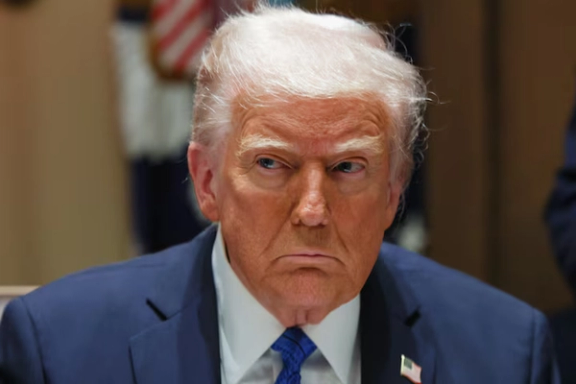
Iran’s ultra-hardline Kayhan newspaper, managed by a representative of the Supreme Leader, has repeated weekend calls to assassinate US President Donald Trump to avenge the 2020 killing of IRGC commander Qassem Soleimani.
On Sunday, the daily expressed support for what it described as revenge for the drone strike in Iraq, ordered by Trump during his first time in office, just one day after a piece had warned "a few bullets are going to be fired into that empty skull of his".
"The shot hasn’t even been fired yet, and already a bunch of local lackeys and US bootlickers are totally freaking out,... since their skulls are as empty as Trump’s, they’ve gotten scared," the outlet wrote on Sunday.
Since the assassination, Trump and several of his aides were put on a hit list but the issue of Soleimani's killing had been somewhat dulled down in recent months amid Trump's renewed campaign of 'maximum pressure' and calls to make a fresh nuclear deal.
The column, presented as a fictional conversation, called advocates of nuclear talks with the US “America’s bootlickers”. Iran's Supreme Leader continues to refuse to engage in direct talks, but has warmed to the idea of using mediation in the wake of Trump's warning that if a new nuclear deal is not reached within two months, the US will bomb Iran.
The former head of the Parliament's National Security Committee reacted to the newspaper's piece on Saturday, criticizing it as inflammatory while the situation remains so volatile.
Heshmatollah Falahatpisheh wrote on X, “Iranians hate those who promote war and terrorism. If you had the courage for war, you would’ve gone to Lebanon. If you have an assassination plan, don’t attribute your recklessness to Iran.
“The nation pays the price for the extremists’ warmongering and terroristic bluffs. The government must disavow this destructive movement.”
Tabnak website also criticized the article, warning of its costs to a nation already suffering a social and economic crisis.
"A newspaper, which happens to be state-affiliated, is publicly promoting a slogan whose cost will ultimately be paid by the people. It seems that if these ultra-revolutionary individuals truly have the motivation to sacrifice for the country, there are plenty of real opportunities to demonstrate that sacrifice," it wrote.
The paper said assassinating Trump would be “a good thing and would bring joy to Palestinians” and armed groups.
The US continues to confront Iran's Houthi militia in Yemen in the Red Sea region amid the group's maritime blockade on commercial shipping.
Ordered by the Supreme Leader in 2023 as a means to target Israeli shipping in order to force a ceasefire in Gaza, the blockade has since affected global shipping, with Trump vowing to tackle the group head on.
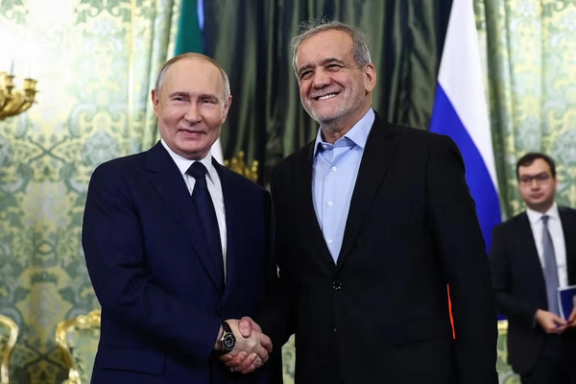
Russia views Iran as a strategic ally and is ready to mediate between Tehran and Washington, a senior Russian academic said, arguing that the West cannot isolate the two countries if they remain aligned.
Nikolay Plotnikov, director of the Center for Scientific and Analytical Information at the Russian Academy of Sciences told Iran's state news agency IRNA, “We are ready to serve as a mediator between Iran and the United States if that helps solve problems through dialogue."
As Iran's Supreme Leader, Ali Khamenei, has until now rejected direct talks, the option of mediation is now essential as US President Donald Trump threatens Iran with military action if it does not reach a nuclear deal within two months.
Trump and Russia's President Vladimir Putin have had better relations than most US presidents with Moscow, though the relationship is still complex, making Moscow an unlikely choice of mediator.
A recent letter from Trump to Iran's Supreme Leader was delivered by the United Arab Emirates.
But the academic, from an institution closely associated with the Putin administration, said diplomacy is the only viable path to revive the 2015 nuclear deal.
“There is no evidence Iran is seeking to produce nuclear weapons,” he said, adding that Tehran is under “closer inspection by the IAEA than many other countries.”
In the interview in which he discussed a recently signed strategic partnership agreement between the two governments, he said the two allies remain firm friends in the face of global sanctions.
“With cooperation between Russia and Iran, neither Washington nor Brussels can bring us to our knees,” said the academic known to move among Russia's political and business elite.
Moscow and Tehran have increased their military cooperation in recent years, particularly in Syria, where both backed former President Bashar al-Assad.
Additionally, Russia has deployed Iranian-made drones and and possibly missiles in Ukraine, despite Tehran’s official denials.
The strengthening of ties between Russia and Iran has accelerated in recent years, driven by mutual isolation stemming from Western sanctions – imposed on Russia for its invasion of Ukraine and on Iran for its nuclear program, support for regional armed groups, and human rights abuses – as well as a shared strategic interest in countering US influence in the region.
However, some media outlets and commentators in Iran, who are in favor of resolving differences with the West, have warned about Russia's true intentions in recent months.
Both countries are also seeking ways to circumvent the sanctions, with recent discussions exploring the expansion of trade using national currencies and alternative financial mechanisms.
Plotnikov also pushed back against Western concerns about Iran’s nuclear intentions in spite of UN reports saying Iran has enough uranium for six nuclear weapons.
Asked whether Moscow could distance itself from Tehran under Western pressure, Plotnikov said that Russia’s foreign policy doctrine in fact prioritizes its relationship with Iran.
“I recommend that you carefully study doctrinal documents such as the concept of Russia’s foreign policy and its priorities. Iran is one of the countries whose relations with Russia are being developed as a priority,” he said.